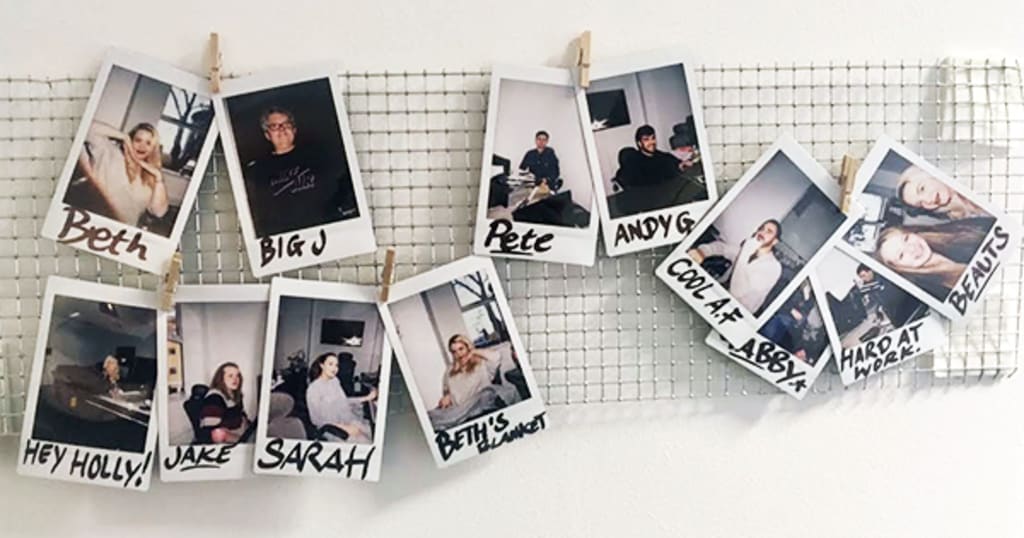
People want to work in a place with purpose, we all want to have an impact!
Unfortunately, corporate environments often care more about the numbers than they do the people. They care more about short-term gains than they do the long-term life of the company and its employees.
Consequently, a feeling of disenchantment can plague their work, and moreover, their every day.
For new founders wanting to attract fresh talent, this feeling of stagnation sparked a lightbulb moment. CEOs began articulating a new sense of purpose in the form of bean bags and free food. Yet for some reason (once the novelty wears off), employees still aren’t happy. The truth is, in a digital age, we’re good at putting filters on things. With so many people being stuffed into the frameworks of large agencies, it shouldn’t come as a shock to anyone that there will be employees whose approach to the field is remedial at best.
In smaller agencies, there is no room for remedial.
There's a Feeling of Family
Small, successful agencies thrive because of dedicated and passionate employees. To remain at the forefront of their industry, their teams must be at the top of their game every single day. A great founder knows the only way to achieve and maintain this attitude is to make their employees a priority. In a small agency, members of staff aren’t just numbers, they’re an integral part of the functioning and prosperity of the business.
It’s the spirit of generosity and understanding that adds fuel to the fire when it comes to igniting a company’s productivity. As an employee, you can be happy, excited, or even proud because of things you did at work, but a real sense fulfillment comes from doing something for somebody else! If we’re willing to give to the person next to us, it’s amazing what they are willing to give to us.
In larger agencies, people are reluctant to do things for each other, the only time they turn to their colleagues is when they need something. They don’t put themselves out there to help somebody because it’s simply "not their job." Smaller agencies have the freedom and flexibility to go the extra mile to ensure the job’s done to the highest standards. Staff training is often on a one-to-one basis and can be done at any given time.
Culture and Personality
This unrestricted culture allows them to be nimble. They can adapt quickly in ever-changing industries, and new ideas are turned around promptly to meet changing needs. Big agencies often try to solve problems over email, which can be an extremely arduous and messy process. As part of a small team, if there’s a problem, you get up and you go and speak to somebody. Boom! Change can happen in an instant. Human interaction is a beautiful thing.
It’s where the real ideas are born.
Ideas are what matter most to a business. Ideas are what turn around companies.
The Money
It’s not the price that determines the quality of work, it’s the people. Often, the only difference between a big agency charging £20,000 and a smaller one charging £2000 is £18,000. Some may argue that more money means more resources. But the small or medium-sized agencies can reach out to the same research sources just as easily as a big agency. Don’t be blinded by a bloated budget. Strip back the filters and facades. You’ll see that big agencies charge big prices to do the same work that a smaller agency can do just as well, if not better.
Closer to the Client
Widely recognized companies may be able to reel in new accounts more easily with a well-known name. But once they begin the work, the companies "leaders" are there to provide "direction" and not much else. The key question lots of clients want to know before signing is:
“Who will be doing the work on their account?”“Who am I trusting with my business?”
Big companies will evade questions like this by saying things like:
“I will personally be keeping an eye on things”
However, keeping an eye on things doesn’t mean they will be hands-on in the decision-making process.
You can rest assured the founders of smaller companies are actively involved in the work they produce. One person with brains, common sense, guts, and know-how is better than ten Russell Group drones. The client has all the pieces to the jigsaw in their hands at the same time. If they’ve got any questions or concerns they can call the smaller agency knowing that they’ll have full access to everyone involved almost immediately, sparing them from any horrendous hold music. They have consistent personal and strategic support throughout the entire process.
The Talent
Small agencies tend to be younger and less beholden to old ways of doing business. For that, they deserve acknowledgment for what they’ve done for younger people because, once again, they have met the needs of changing times.
They’ve created working environments that allow and encourage young people to really come into their own. As Simon Sinek articulated in his speech "Working with Millennials," people born after the year of 1986 haven’t had the chance to practice the art of patience. They don’t want to spend years (perhaps their whole lifetime) trying to work their way up in a huge company! They’ll try, but if they don’t feel like they are getting anywhere, or like they aren’t making an "impact," they quit.
Not because they’re lazy, but because they’ve grown up during a time in which they were told they were special. They were told they could have anything they wanted, just because they want it! As a result, when they join a larger agency they often leave because they feel either under-appreciated, underpaid, or uninspired.
It’s now the responsibility of the companies who hire these people to help them gain the social skills they’ve missed out on. Large companies can’t always offer the right support when it comes to encouraging confidence and cooperation skills. Small agencies continue to bridge the gap between the old and the new by giving them a chance to create impact, and by judging them off what really matters: their ideas.
If you want the best results, work with a company that is as invested in your results as you are. Big agencies worth millions of pounds don’t always get it right. Sometimes they may measure success on “Did we win an award?” At a small agency, the question is more likely to be, “Did it help our client’s business?”
About the Creator
Sarah B
A travel enthusiast from England, who swapped the rainy clouds of Manchester for beachside bliss in Playa Del Carmen. If I'm not salsa dancing by the shore, you’ll find me soaking up the sun in one of my favorite rooftop party pools.






Comments
There are no comments for this story
Be the first to respond and start the conversation.